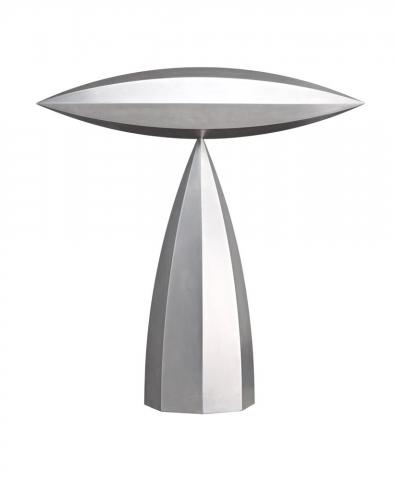UNTITLED, 1999
AKIO MAKIGAWA
stainless steel
60.0 cm height
signed with initials, dated and numbered at base: AK 10 / 1999 / 1/3
Private collection, Melbourne
Bonhams and Goodman, Melbourne, 23 April 2007, lot 680
Private collection, Melbourne
Cooper, J., Akio Makigawa, Macmillan Art Publishing, Melbourne, 2014, cat. 150 (illus.)
Monumental in its stillness and poise, Untitled, 1999 is a key work from Akio Makigawa’s series on the theme of ‘beginning’ and the genesis of life. Makigawa embraced and explored the allegorical and communicative possibilities of a range of materials, most notably stone and stainless steel. Enchanted by the ‘honesty to materials’1, Makigawa ingrained in his sculptural work both spiritual presence and structural formality.
Tapping into the emotive power of the seed form in its implicit youthfulness and promise, Untitled reflects on the amalgamation of the organic and the machine. ‘I am looking at the organic and mechanical sides, machine-like. I live in the city and buildings go up. They can grow by emerging or being dropped onto a site by a crane. I am thinking that both ideas, organic and mechanical, can be put together.’2 Deconstructing the seed to its fundamental geometrical form invites the viewer to see this duality – a motif expressed repeatedly in Makigawa’s later works. Untitled achieves a pensive tranquillity within the raw power of stainless steel. Teetering on a point, the seed’s smooth and echoed edges are an excellent example of the artist’s characteristic rhythm, enabling the forms to reach a weightless equilibrium.
In the same vein as Brancusi, Makigawa embraced notions of the multiple – a reproduction of forms in fluctuating scales and materials. Such an approach liberated the artist from the physical and technical production of a work, allowing him to divert his energy into the lyrical and intangible treatment of the same few forms. Makigawa delighted in the ability to develop an idea organically, turning over his conceptual development to the forces of time. ‘If I think more, maybe I’ll get a better idea. Time sometimes makes decisions for me.’3 The artist returned repeatedly to elemental forms including fire, clouds, seeds and vessels, each multiple skilfully imbued with distinct, self-assured charisma. His mature works pay homage to Brancusi, not only in the notion of multiples, but also in their recognition of a sculpture’s base and its ability to independently expand the potential of a work. The basic geometric forms and symmetry of Brancusi’s Endless Column, 1918 inspired Makigawa’s pursuit for the timeless and universal symbology achieved in Untitled.
Today, sculptures by Makigawa can be found in several state and regional collections including the National Gallery of Australia, Canberra and National Gallery of Victoria, Victoria, complimented by acclaimed public commissions including Time and Tide, 1994 which stands at the Melbourne City Town Hall. Produced in the same year as his untimely passing, Untitled is an outstanding summation of Makigawa’s oeuvre, demonstrating his masterful treatment of materials and elemental themes.
1. Capon, E., ‘Foreword’ in Cooper, J., Akio Makigawa, Macmillan Art Publishing, Melbourne, 2013, p. 104
2. Cooper, J., Akio Makigawa, Macmillan Art Publishing, Melbourne, 2013, p. 494
3. Ibid., p. 495
MELISSA HELLARD
